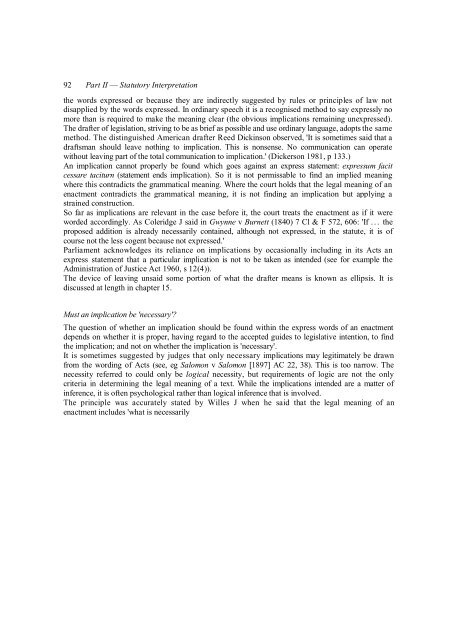Statutory Interpretation The Technique of Statutory ... - Francis Bennion
Statutory Interpretation The Technique of Statutory ... - Francis Bennion
Statutory Interpretation The Technique of Statutory ... - Francis Bennion
You also want an ePaper? Increase the reach of your titles
YUMPU automatically turns print PDFs into web optimized ePapers that Google loves.
92 Part II — <strong>Statutory</strong> <strong>Interpretation</strong><br />
the words expressed or because they are indirectly suggested by rules or principles <strong>of</strong> law not<br />
disapplied by the words expressed. In ordinary speech it is a recognised method to say expressly no<br />
more than is required to make the meaning clear (the obvious implications remaining unexpressed).<br />
<strong>The</strong> drafter <strong>of</strong> legislation, striving to be as brief as possible and use ordinary language, adopts the same<br />
method. <strong>The</strong> distinguished American drafter Reed Dickinson observed, 'It is sometimes said that a<br />
draftsman should leave nothing to implication. This is nonsense. No communication can operate<br />
without leaving part <strong>of</strong> the total communication to implication.' (Dickerson 1981, p 133.)<br />
An implication cannot properly be found which goes against an express statement: expressum facit<br />
cessare taciturn (statement ends implication). So it is not permissable to find an implied meaning<br />
where this contradicts the grammatical meaning. Where the court holds that the legal meaning <strong>of</strong> an<br />
enactment contradicts the grammatical meaning, it is not finding an implication but applying a<br />
strained construction.<br />
So far as implications are relevant in the case before it, the court treats the enactment as if it were<br />
worded accordingly. As Coleridge J said in Gwynne v Burnett (1840) 7 Cl & F 572, 606: 'If ... the<br />
proposed addition is already necessarily contained, although not expressed, in the statute, it is <strong>of</strong><br />
course not the less cogent because not expressed.'<br />
Parliament acknowledges its reliance on implications by occasionally including in its Acts an<br />
express statement that a particular implication is not to be taken as intended (see for example the<br />
Administration <strong>of</strong> Justice Act 1960, s 12(4)).<br />
<strong>The</strong> device <strong>of</strong> leaving unsaid some portion <strong>of</strong> what the drafter means is known as ellipsis. It is<br />
discussed at length in chapter 15.<br />
Must an implication be 'necessary'?<br />
<strong>The</strong> question <strong>of</strong> whether an implication should be found within the express words <strong>of</strong> an enactment<br />
depends on whether it is proper, having regard to the accepted guides to legislative intention, to find<br />
the implication; and not on whether the implication is 'necessary'.<br />
It is sometimes suggested by judges that only necessary implications may legitimately be drawn<br />
from the wording <strong>of</strong> Acts (see, eg Salomon v Salomon [1897] AC 22, 38). This is too narrow. <strong>The</strong><br />
necessity referred to could only be logical necessity, but requirements <strong>of</strong> logic are not the only<br />
criteria in determining the legal meaning <strong>of</strong> a text. While the implications intended are a matter <strong>of</strong><br />
inference, it is <strong>of</strong>ten psychological rather than logical inference that is involved.<br />
<strong>The</strong> principle was accurately stated by Willes J when he said that the legal meaning <strong>of</strong> an<br />
enactment includes 'what is necessarily

















